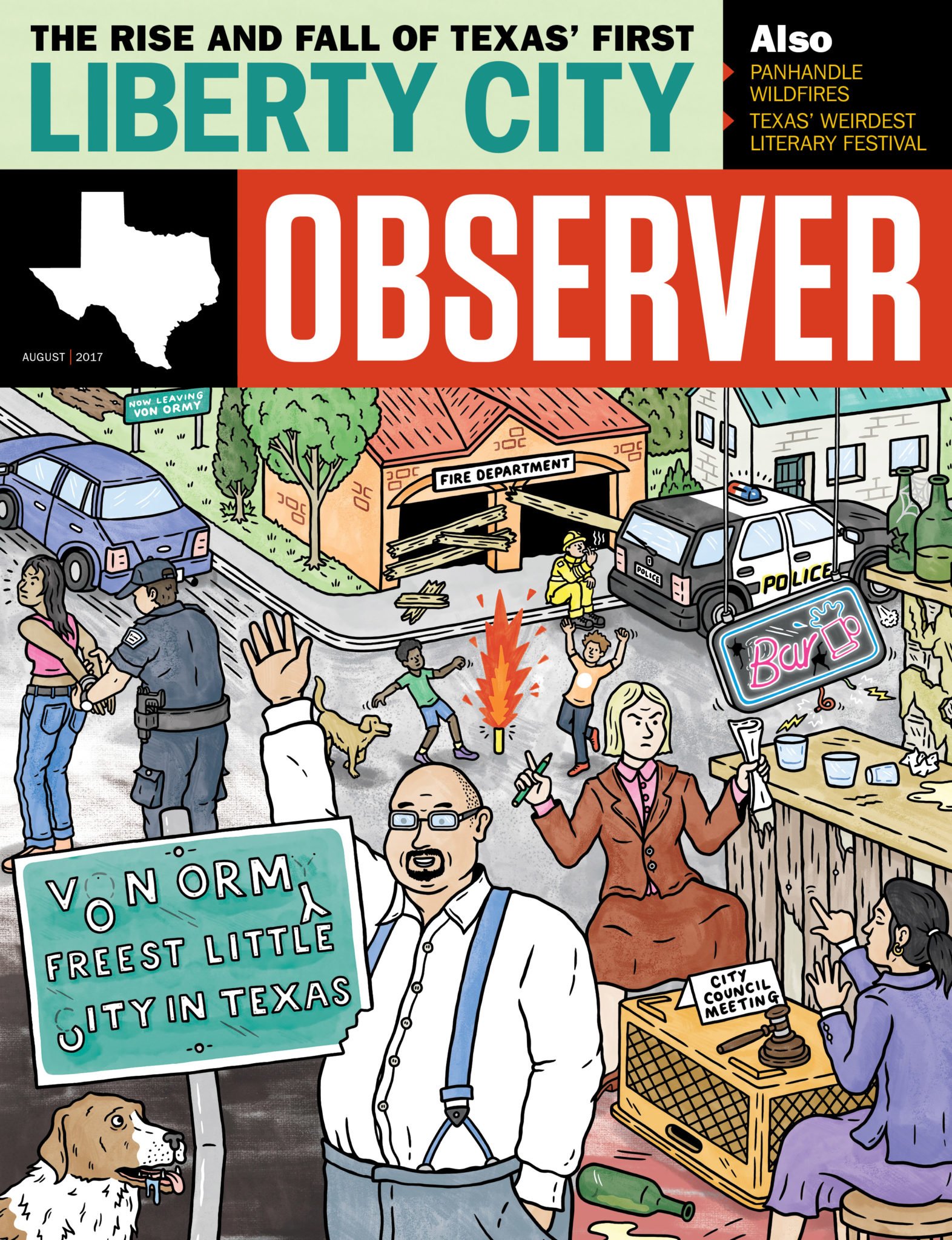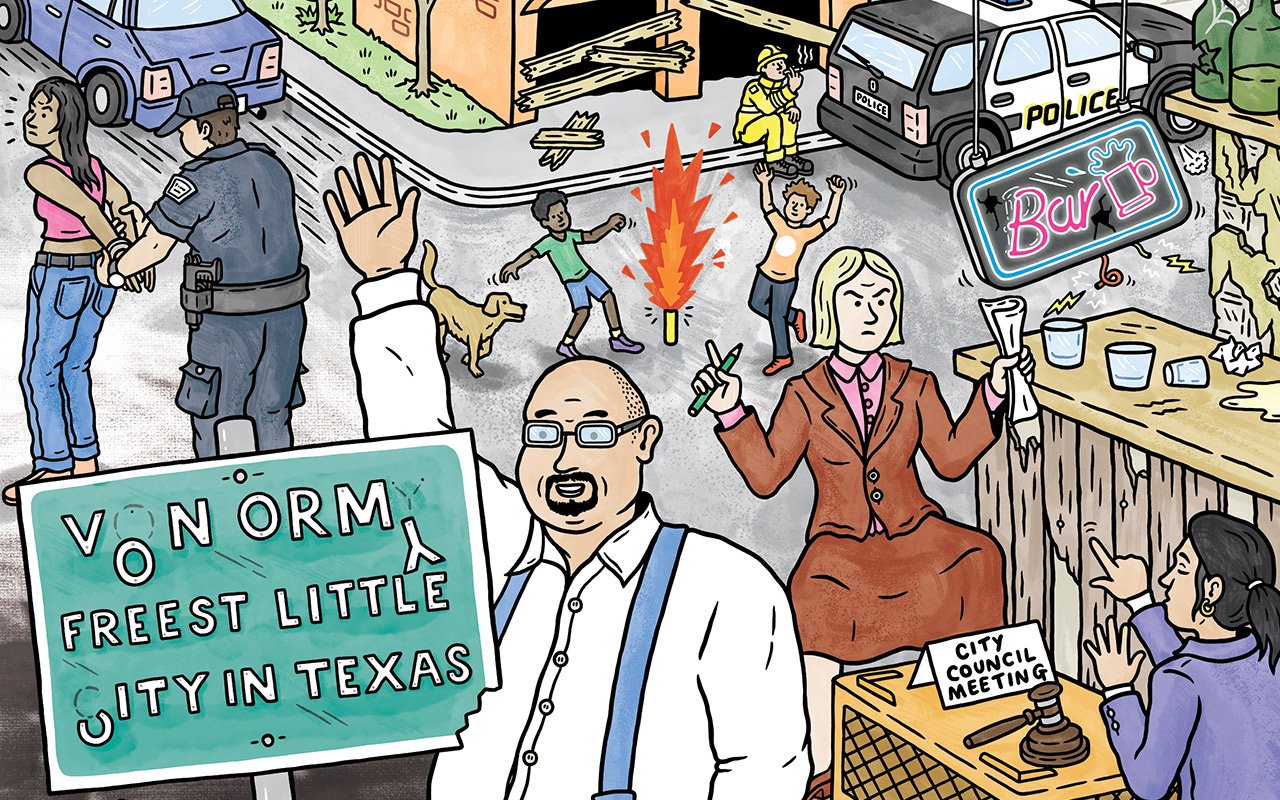
The Rise and Fall of the ‘Freest Little City in Texas’
How a libertarian experiment in city government fell apart over taxes, debt and some very angry people.
A version of this story ran in the August 2017 issue.
The Rise and Fall of the “Freest Little City in Texas”
How a libertarian experiment in city government fell apart over taxes, debt and some very angry people.
by James McCandless
July 31, 2017
The abandoned cop cars sat in Trina Reyes’ yard for eight months. She wanted them gone, but there were no police to come get them. Last September, the police department in Von Ormy — a town of 1,300 people just southwest of San Antonio — lost its accreditation after it failed to meet basic standards. Reyes was mayor at the time, so the three patrol cars, as well as the squad’s police radios and its computers, ended up at her home. It was just another low point in a two-year saga that she now counts as one of the most difficult experiences of her life.
“This is one of the worst things I’ve ever done,” she said of being mayor. “I’ve never dealt with such angry people. I’m washing my hands of everything. … I’m going to travel. I’m going as far away from Von Ormy as I can.”
For the last few years, Von Ormy has been in near-constant turmoil over basic issues of governance: what form of municipal government to adopt, whether to tax its residents, and how to pay for services such as sewer, police, firefighters and animal control. Along the way, three City Council members were arrested for allegedly violating the Open Meetings Act, and the volunteer fire department collapsed for lack of funds. Nearly everyone in town has an opinion on who’s to blame. But it’s probably safe to say that the vision of the city’s founder, a libertarian lawyer whose family traces its roots in Von Ormy back six generations, has curdled into something that is part comedy, part tragedy.
In 2006, fearing annexation by rapidly encroaching San Antonio, some in Von Ormy proposed incorporating as a town. But in government-averse rural Texas, incorporation can be a hard sell. Unincorporated areas are governed mainly by counties, which have few rules about what you can do on private property and tend to only lightly tax. There’s no going back from what municipal government brings: taxes, ordinances, elections and tedious city council meetings. Still, the fear of being absorbed by San Antonio — with its big-city taxes and regulations — was too much for most Von Ormians.
Enter Art Martinez de Vara. At the time, Martinez de Vara was an ambitious third-year law student at St. Mary’s University in San Antonio, a local boy with a penchant for Texas history and right-wing politics.
Martinez de Vara suggested a compromise of sorts. Von Ormy could become a “liberty city” — a stripped-down, low-tax, low-government version of municipal government that’s currently en vogue among the tea party in Texas.
Initially, the city would impose property and sales taxes, but the property tax would ratchet down to zero over time. The business-friendly environment would draw new economic activity to Von Ormy, and eventually the town would cruise along on sales taxes alone.
There would be no charge for building permits, which Martinez de Vara said would be hand-delivered by city staff. The nanny state would be kept at bay, too. Want to shoot off fireworks? Blast away. Want to smoke in a bar? Light up. Teens wandering around at night? No curfew, no problem.
Martinez de Vara and his mother, Sally Martinez, along with other prominent residents, started the Commission to Incorporate Von Ormy. He gave Von Ormy a motto: “The Freest Little City in Texas.”
Folks in Von Ormy liked what they heard and in May 2008 voted to incorporate. Martinez de Vara was elected mayor that November.
In a 2015 presentation he gave at the Texas Public Policy Foundation, a conservative think tank, Martinez de Vara said that a group of people with no political experience took it upon themselves to do everything a large city like San Antonio does but at a lower cost. He touted Von Ormy’s ability to provide animal control services, a 20-officer police department — a mix of paid officers and volunteers — and an online city hall.
“We were blessed with this unique opportunity to experiment with democracy,” he said.
Today, there is no city animal control program and stray dogs roam the streets. The Bexar County Sheriff’s Office patrols the town instead of city police, and City Hall resides in a mobile home with one full-time staffer — though that’s a step up from the dive bar where City Council met until the owner bounced them out. If you go to the city’s website, you’ll be informed that it’s still under construction.
If Von Ormy is a libertarian experiment with democracy, it’s one that hasn’t turned out as expected.
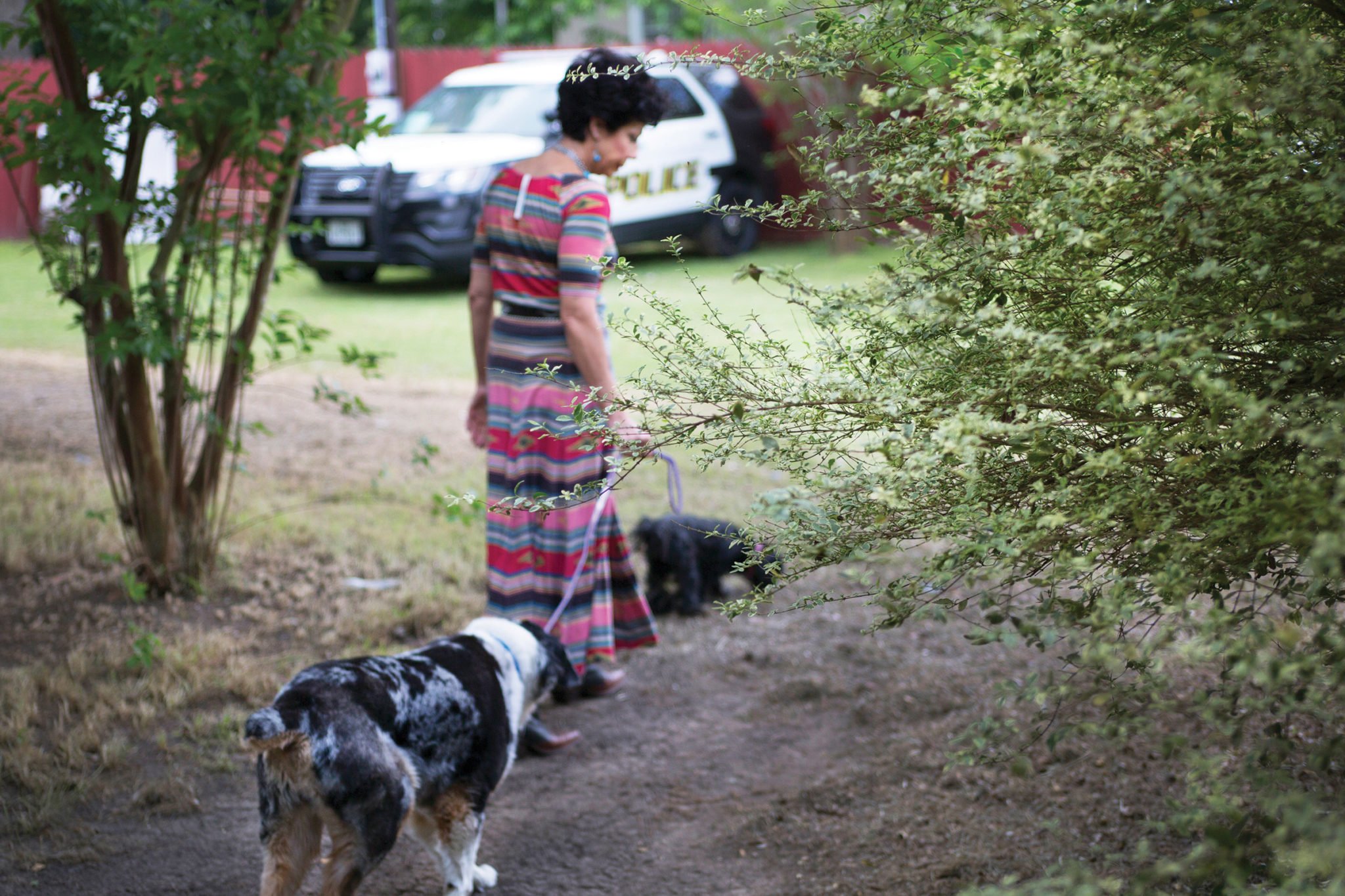
The crisis of government in Von Ormy doesn’t present itself at first glance. The town is located on I-35 just south of the Medina River, where San Antonio’s impressive sprawl gives way to the scrub brush of South Texas. There’s a post office, of course, plus some gas stations, a diner, a trailer home dealer and the MGM Cabaret strip club. A giant oak tree in town is believed by some local historians, including Martinez de Vara, to have been the encampment for Santa Anna before he laid siege to the Alamo.
Reyes lives near I-35 in a distinct two-story blue house. A retired buyer for a beauty supply company, she moved from San Antonio to Von Ormy in 1982. When Martinez de Vara stepped down as mayor in 2015, he tapped Reyes to run. She had been an early supporter of the liberty city idea. But when I visited her this spring, she was counting down the days till her term expired in May.
From the beginning, she said, the town had been divided.
“Some really liked it,” Reyes said. “They liked the possibility of getting street lights, sewage, better roads and all of the stuff that comes with incorporating. … There was quite a bit promised and people bought into it, including myself.”
Others thought that the process would lead to unnecessary fights and power grabs.
“A lot of people that did not want to incorporate were saying that once you become a political entity you start with the corruption, the infighting and all of the stuff that comes with having public figures,” she said. “They said it was going to divide the city, which it did. The majority of the people that spoke up against [incorporating] were right then about what’s happening now.”
As mayor, Martinez de Vara’s first priority was to lure chain stores with the town’s low-tax, low-regulation branding. But there was a problem: Von Ormy lacked a sewer system and it would be expensive to connect to San Antonio’s main wastewater system. The San Antonio Water System, which services most of Bexar County, told town officials that the connection would cost $4 million to $5 million.
According to Reyes, City Administrator James Massey recommended floating a bond, standard practice for most cities. But Martinez de Vara rejected the recommendation. Liberty cities aren’t supposed to take on debt, after all. (Martinez de Vara didn’t respond to numerous requests for comment.)
Reyes said most people in Von Ormy agreed with Martinez de Vara’s position but that it put the town in a bind. “You want to be a liberty city? No taxes,” she said. “We could only afford to put in $500,000, if that, but where would we get the rest from?”
The sewer system was never installed, and the town still relies on septic.
The lack of a centralized wastewater system made it more difficult to recruit businesses. But the oil boom in the Eagle Ford Shale — the vast shale play that stretches from Laredo into East Texas — helped juice the businesses along the I-35 strip in Von Ormy. Martinez de Vara and the City Council stuck to the plan of ratcheting the property tax rate down every year. In 2009, the rate stood at a modest 39 cents per $100 of value — less than neighboring San Antonio or Somerset, a small town to the south. By 2014, they’d cut it to 25.5 cents — enough to generate $79,000 in revenue. Meanwhile, the sales tax brought in about $215,000 that year.
Martinez de Vara promised that the property tax would be eliminated altogether by 2015, the bold step he’d envisioned at the town’s inception.
“Many of our residents are on fixed incomes and property taxation is the single greatest threat to continued home ownership and the ability to pass the fruits of a lifetime of work onto the next generation,” he told the San Antonio Express-News in 2014.

But two things happened around this time: First, the bottom fell out of the oil economy. With oil prices in free-fall in 2014 and 2015, the drilling rigs in the Eagle Ford Shale started packing up, as did many of the workers, trucks and ancillary oil field services.
Second, some were beginning to sour on the liberty city model. On the five-member City Council, three council members — Jacqueline Goede, Verna Hernandez and Carmina Aguilar — had banded together in a bloc that was increasingly at odds with Martinez de Vara and the two other council members, one of whom was Sally Martinez. The most explosive issue was property taxes. The three women thought it was foolish to eliminate property taxes altogether. Sales taxes rise and fall with the economy, and few cities rely on them alone.
“As new as we are and as small as we are, to grow we need those taxes,” Goede told the Express-News. “We need them desperately.”
What ensued was a confusing series of boycotted meetings, obscure loopholes and eventually a possibly illegal hearing that landed the three women briefly in jail. In September 2014, Martinez de Vara had formally proposed zeroing out the property tax, but Goede, Hernandez and Aguilar voted it down 3-2 and, at least for five days, kept the property tax in place. However, to formally ratify the rate, per state law, at least four council members needed to hold another meeting to vote, but Sally Martinez and Debra Ivy refused to show up to any hearing with ratification on the agenda. The result: Martinez de Vara got his way and the property tax rate was eliminated.
Frustrated, Goede, Hernandez and Aguilar took a radical, and possibly illegal, step: They formed a kind of brief shadow government, holding their own City Council hearing at the Von Ormy fire station without Martinez de Vara and the two other council members. At the hearing, they elected Goede mayor pro tem, established a property tax and fired the head of the police department.
Martinez de Vara caught wind of the meeting and got a judge to nullify the actions taken in it. Soon, the Texas Rangers opened a criminal investigation into possible violations of the Texas Open Meetings Act, resulting in misdemeanor charges. In May 2015, the three council members turned themselves in to the Bexar County Sheriff’s Office. Though the charges were eventually dropped and the women continued serving on City Council, the incident only inflamed tensions in the community.
“After that, there was a lack of authority, lack of direction and a lack of enthusiasm,” said Michael Suarez, the former animal control worker for the city and a Martinez de Vara supporter. “Everyone started acting like children and nothing got done.”
Even as Von Ormy descended into chaos, Martinez de Vara’s own profile had been rising. Folks from around the state had started calling him with questions about how to form a liberty city. Martinez de Vara found himself with a niche law practice. He says he has helped four or five Texas towns incorporate as liberty cities, about half the state total in the last decade.
“We were blessed with this unique opportunity to experiment with democracy.”
The GOP had also taken notice. In 2011 and 2012, Martinez de Vara served as chief of staff to one-term Representative John Garza, a San Antonio Republican. Then, in 2014, Senator Konni Burton, a libertarian-leaning Republican from Fort Worth, brought him on as chief of staff. That session, Burton introduced Senate Bill 710, which would codify the liberty city model as an official form of municipal government, with restrictions on regulations, debt and the implementation of taxes. The bill died in committee.
Today, he’s the assistant general counsel for the Texas Republican Party and the city attorney for Kingsbury, a liberty city near Seguin in Guadalupe County.
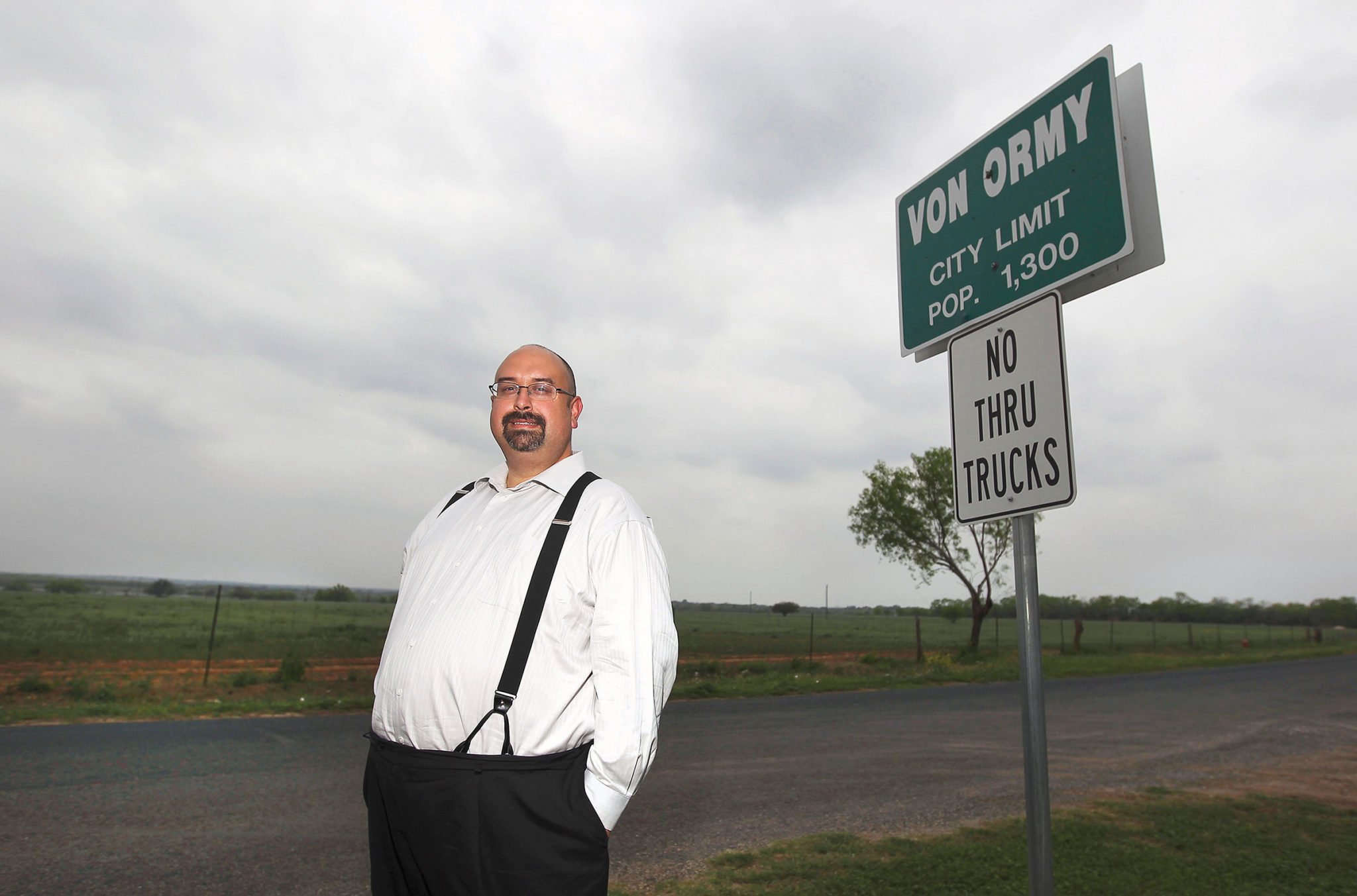
In May 2015, Martinez de Vara stepped down as mayor — but not before asking Reyes, a member of the City Council first elected in 2013, to run as his replacement. She and Martinez de Vara agreed on the top priority: getting the three women off the council.
“It got to the point that the city was spending $20,000 to $30,000 a month in legal fees,” she said. “All three of them would pick up the phone and ask the same question and we’d get charged for all of them.”
Despite pressing city business, council meetings often devolved into chaos. For example, at a September 2015 meeting, Reyes angrily told Goede and Hernandez they were “speaking out of turn” and threatened to call the police if they kept talking. But when Hernandez persisted, Reyes ordered the police chief, who was present at the meeting, to escort Hernandez outside. Hernandez was arrested and booked into jail for disrupting a meeting, a misdemeanor. But that didn’t quiet Hernandez or her supporters.
One day, Reyes said, she got a call from Martinez de Vara.
“He told me that the only way that we were going to get rid of those women is to change to a commissioner-style government,” she said. “And at that point, I would have done anything to get rid of those three women. They were nothing but trouble.”
Martinez de Vara recommended that Von Ormy switch from what’s known as a Type A municipality to a Type C. Instead of the usual five council members and a mayor, Type C cities have two commissioners and a mayor. According to the Texas Municipal League, only 27 of the 1,200 municipalities in Texas are set up this way. In November 2015, voters narrowly approved the change, with 129 in favor and 115 against. The new commission started holding meetings the next month.
When I visited Reyes in Von Ormy in March, she was in despair about the arrangement. Halving the council from six to three elected officials hadn’t brought unity.
She had all but stopped speaking to the two commissioners — longtime City Council member Sally Martinez and Alex Quintanilla, another stalwart in the city government. Reyes simply stopped showing up for council meetings in early 2017, accusing Martinez and Quintanilla of ganging up on her.
In September, Martinez and Quintanilla voted to reclassify the mayor’s office as a conference room and mandated that Reyes pay for the desk’s relocation. “They said it was too big and that I had to take it home,” she said. “Now I work from home.”
She was also worried about violating the Open Meetings Act again, which is easy to do when there are only three people in charge of the city and two constitutes a quorum.
“If two of us talk on the phone, I think that would be a violation,” she said. “We’ve just stopped speaking to each other. And Alex lives across the alley from me. It’s really sad.”
She points to a February meeting between county officials and rural leaders in southern Bexar County as evidence of the precariousness of their situation.
I went to a forum with the county to talk about potential Community Development Block Grant funds in nearby Somerset, and I didn’t realize until I put my glasses on that Sally and Alex were there,” she said. “I thought, ‘Oh my God, we’re in trouble again.’”
In September 2016, Von Ormy made headlines when its police department was forced to shut down. For nearly a year, Reyes and the two city commissioners had been locked in a power struggle over who should be the police chief. When Reyes took over as mayor, she moved to sack Police Chief Greg Reyes (no relation), who she and others accused of harassing council members and city staff and lying about his law enforcement background. (According to a report written by a private investigator tapped by Mayor Reyes, the police chief had lied on his résumé about obtaining a degree from San Antonio College and being assigned to the Frio County Sheriff’s Department Narcotics Task Force, which turned out not to exist.)
Mayor Reyes fired Chief Reyes and convinced the City Council to hire a man named Pedro Rosario. The new police chief claimed to find some serious problems left behind by his predecessor.
“The evidence room had very little to no control measures,” he told me in an April interview. “It was literally an 18-wheel trailer that was unsecured. There was no cataloging. I found unmarked boxes filled with everything from weapons to narcotics … and anybody could walk in, and they did. A lot of the City Council members would just walk in and want to see a file or just grab things.” (Greg Reyes did not respond to numerous requests for comment.)
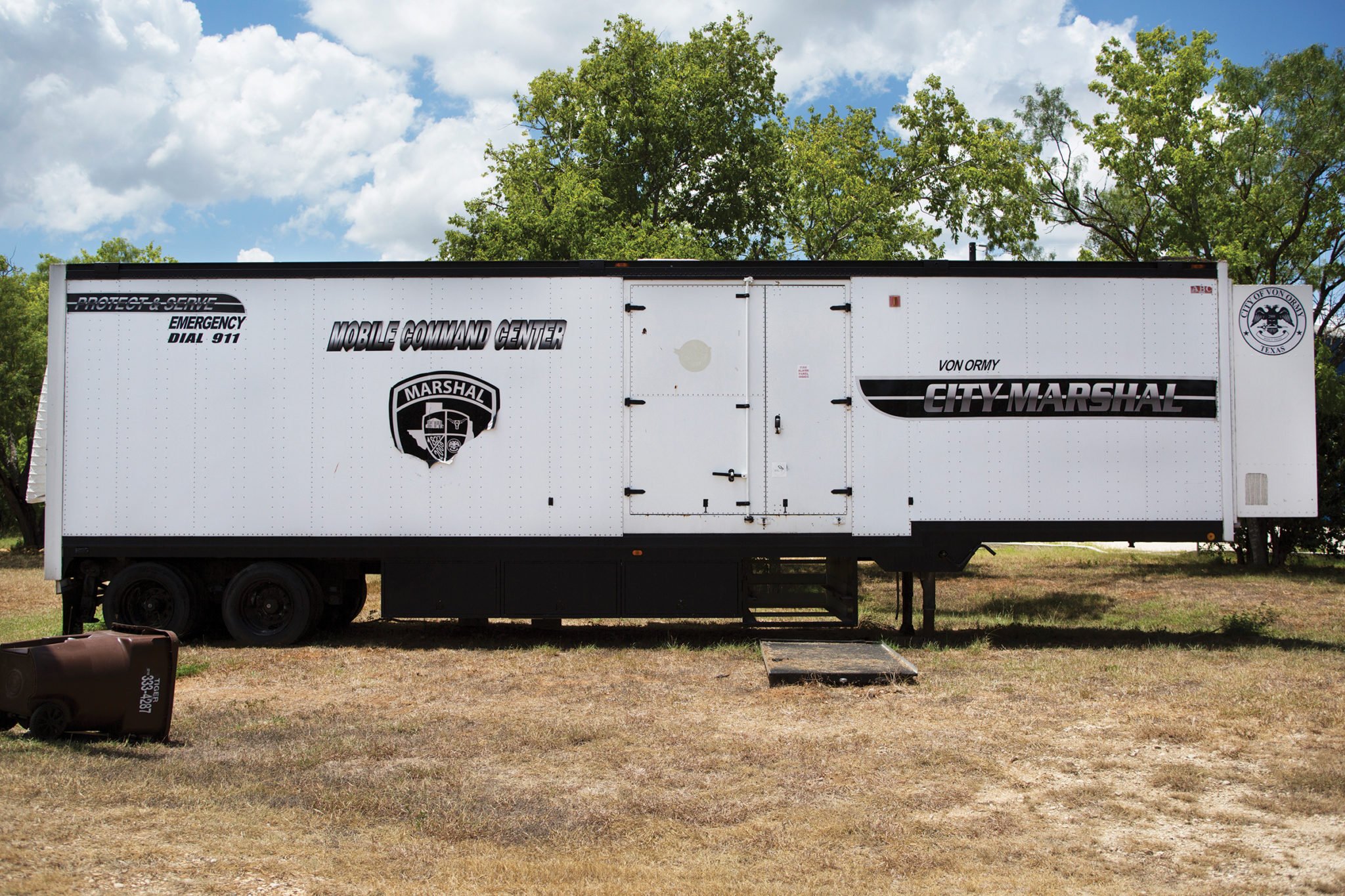
“The evidence room was literally an 18-wheel trailer that was unsecured. I found unmarked boxes filled with everything from weapons to narcotics … and anybody could walk in and they did.”
Then in the summer of 2016, the two commissioners, Martinez and Quintanilla, voted to fire Rosario and rehire Greg Reyes. But Mayor Reyes claimed the hiring was illegal and refused to recognize Reyes as police chief.
Then in September, the dispute was finally brought to an end when Bexar County Sheriff Susan Pamerleau wrote a letter to Mayor Reyes. Pamerleau said her department would no longer provide dispatch services because there was simply “too much instability” in the department. Without dispatch services, the Texas Commission on Law Enforcement quickly pulled the Von Ormy PD’s accreditation.
The Bexar County Sheriff’s Office has been patrolling the town ever since. The three patrol cars Von Ormy had received as a donation from Bexar County ended up in Reyes’ yard. After her term ended in May, they were moved in front of City Hall.
Jake Galvan, a retired mechanic, says that the police department was an embarrassment to the town and the source of rumors about misconduct and other illegal behavior.
“They didn’t hire anybody that’s a veteran,” he said. “They just hired a bunch of rookies with no experience.”
In Galvan’s view, the liberty city experiment has gone all wrong.
“This ain’t going well at all,” he said. “We’ve got a bunch of empty buildings, a lot of [federal] grant money spent, and for what? We have a fire station that nobody wants to operate and a police station with no police. Where did all that money go?”
In early May, Von Ormy elected a new mayor: Sally Martinez, the only person who has served on the council since the beginning.
“We are in the process of trying to bring back our police department,” she told me in a brief April interview. “We just want to move forward and improve the city however we can.”
David Farr, her challenger, is a mechanic who had started to attend meetings over the past year and wanted to change what he saw as stalled progress and nepotism.
“The only way to make Von Ormy sustainable is to get more businesses out here,” he said.
“If things don’t change, we’re going to be in trouble in, I’d say, two years. We’ll have to start borrowing to get the roads fixed.”
He pins the town’s woes on Martinez de Vara’s crusade to establish other liberty cities, a common complaint heard in Von Ormy.
“I’ll give him credit, he’s the one who got the city going,” he said. “But then, all of a sudden, he drops out. He’s up in Austin. He’s too busy.”
Reyes thinks the liberty city experiment has failed. With increasing expenses, a population resistant to any taxes, and economic development dead in the water, she thinks the town is only a few years away from a fiscal crisis, when the commission will have to decide whether to take on debt.
“We’re halfway there,” she said. “Without ad valorem taxes, we’ll be done in three to five years. If we can’t attract more businesses here and provide the infrastructure, then I think we’re done.”
But others are protective of Martinez de Vara’s vision and blame Reyes for the dysfunction.
“This ain’t going well at all. We’ve got a bunch of empty buildings, a lot of grant money spent, and for what?”
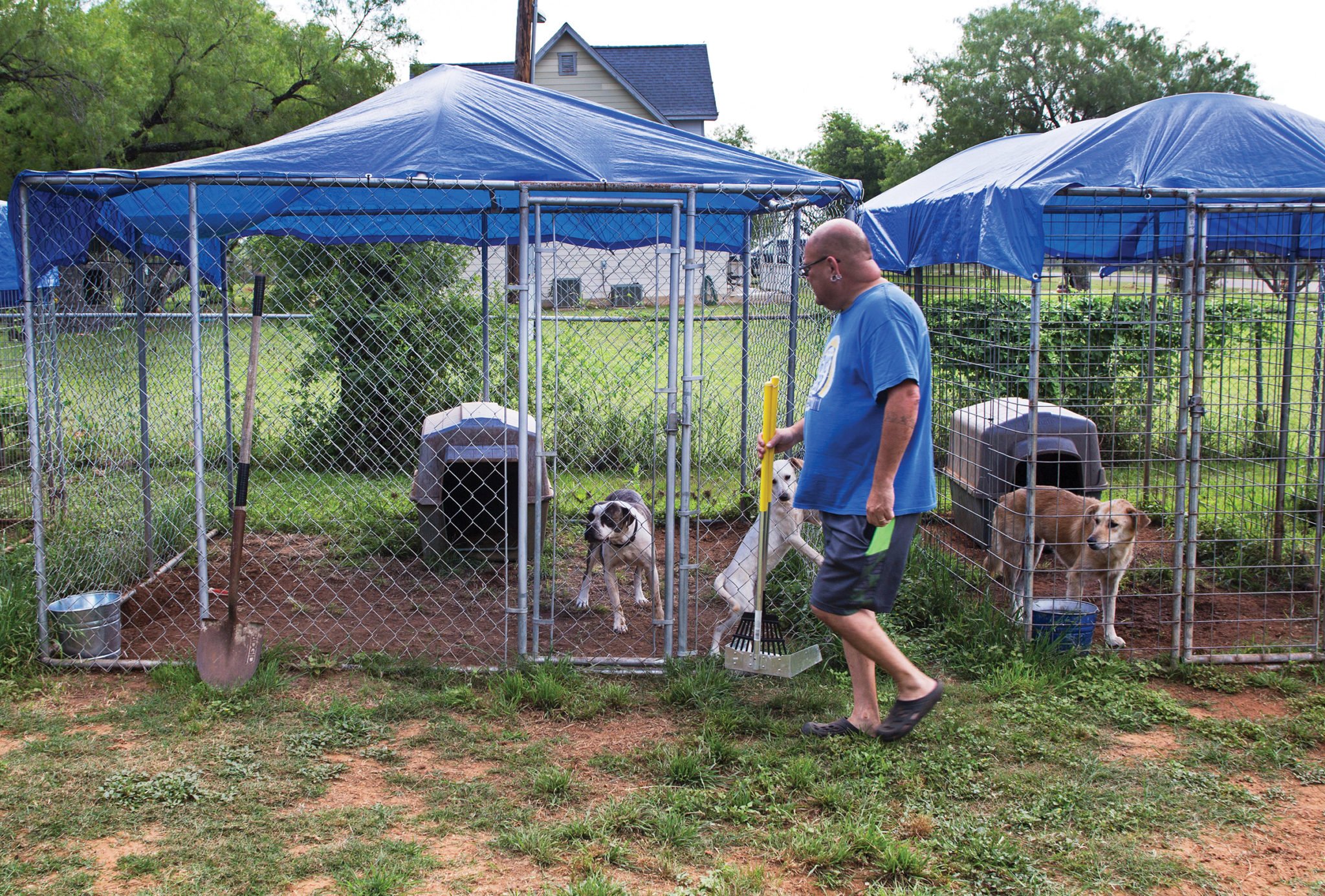
Michael Suarez, the former animal control worker, was born and raised in Von Ormy. He says that Martinez de Vara was a capable leader who simply saw an opportunity to climb the political ladder.
“Trina just wanted the power, but she didn’t know anything,” Suarez said. “All she wanted to do was just scream about how she’s in charge and order people around. She would scream at people, and that’s not how you do things.”
Suarez was one of the biggest supporters of incorporation, spending his free time block-walking to convince his neighbors that it was the right thing to do.
His wife, Amy, was on the City Council from 2011 to 2013 and was an ally of Martinez de Vara’s.
“I think we’re just young,” she said. “We’ve reached our temper tantrum stage and we just need to get past it. But a lot of the people here don’t care. They want to be left alone, but if something’s not done soon then San Antonio’s going to annex us. Then we’ll have to pay the taxes that Von Ormy was established to get out of in the first place.”
Michael says that the election was an opportunity for things to settle down and live up to the trust given to them by county officials, but that there will be some hard work in getting the town they want back.
“We worked so hard to get this far,” he said. “But it’s kind of turned into George Orwell’s Animal Farm. We’re all equal, but some of us are more equal than others. There’s nobody competent enough to lead this city and we sure as hell can’t attract anybody to come and fix us. We have to do this ourselves.”
(Illustration by Matt Johnstone)
This article appears in the August 2017 issue of the Texas Observer. Read more from the issue or become a member now to see our reporting before it’s published online.
